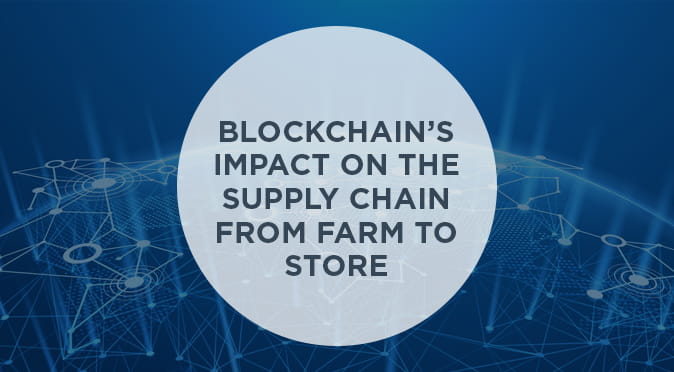
Oct. 12, 2018 | InBrief
Blockchain's impact on the supply chain from farm to store
Blockchain's impact on the supply chain from farm to store
After having tested Blockchain internally in tracking mangoes, on June 25, 2018 Walmart announced that it would join the IBM Food Trust and help create a global supply chain system leveraging blockchain tech. By doing so, Walmart seeks to decrease food safety issues and increase response times when issues occur. Additionally, Walmart wants to gain valuable visibility into the produce supply chain, from farm-to-store. Last week Walmart applied pressure on its suppliers, urging them to begin leveraging blockchain tracking technology by 2019.
This announcement is a definitive step towards the commercial use of blockchain to enable technology solutions solving real business problems. Blockchain advocates often talk about the potential of blockchain but lament that it still lacks realistic use cases – resulting in a technology that is viewed as hypothetical. Hopefully by next September, when Walmart is targeting the rollout of this system, companies will have a tangible example of the value blockchain can provide.
While there are clear benefits to Walmart, it’s important to understand the role and possible value of blockchain technology for the entire supply chain. During the annual Soy in the City event we had the opportunity to hear from a key member of that supply chain: the farmer.
During our discussions, farmers expressed how blockchain tech would likely require an investment in devices to capture and write transactions to the chain. Farmers saw value in leveraging these devices to automatically track yield production, crop quality, and pesticide levels. However, they had concerns with the initial investment costs and the accuracy of this type of technology to correctly measure and collect data.
Precision farming already exists – farmers are tracking fertilizer, seeds, and yields through IOT devices. There are barriers to entry and a need for increased accuracy, but with time we will see increases in accuracy and decreased costs. Once those challenges are overcome, blockchain can bring several benefits. For example, the ability to distribute farming data to all members of the chain in real time. With real-time information farmers can react within minutes as opposed to days. Additionally, removing siloed data sets allows all members of the chain to react to the information. For example, suppliers could make additional purchases if forecasted yield amounts were low.
Farmers were also interested in blockchain’s ability to reduce the need for brokers. Today farmers work with brokers to represent their crops on the market. If blockchain could bypass those brokers, going straight to purchasers, like Walmart, it would result in cost savings for the farmer and purchaser.
This is where we at WMP see great potential – disintermediation through blockchain. By leveraging the characteristics of the blockchain (consensus, immutability and smart contracts) traditional intermediaries that support marketplace transactions would not be necessary. We are seeing this disruption in the financial market in the removal of third parties, like banks, to transfer value across the globe – it is only a matter of time for the disruption to spread to other markets.
Lastly, farmers saw value in automating traceability to reduce the impact of recalls and minimize the reach of recalls. Leveraging the immutability and auditability of data added to a blockchain (key functionalities of the technology), all parties on the supply chain have access to trusted data. By automating traceability, the need for manual documentation and detailed review of handwritten notes decreases resulting in less disruption to farmer. Walmart’s blockchain use cases will help move this forward.
While we are excited to see Walmart drive blockchain adoption, it’s important to look at the potential impact blockchain would have throughout the supply chain. As you look to your business and assess the potential of blockchain, considering the full impact of incorporating the technology into your technology stack is critical to ensure appropriate application of the technology. The implementation of a technology like blockchain has impacts throughout the technology ecosystem. At West Monroe Partners we partner with clients to help them realize the full potential and understand the holistic impact of cutting edge technologies like Blockchain. If you’re interested in learning more, please don’t hesitate to reach out.